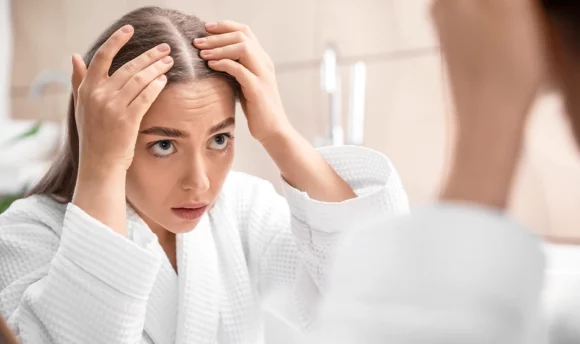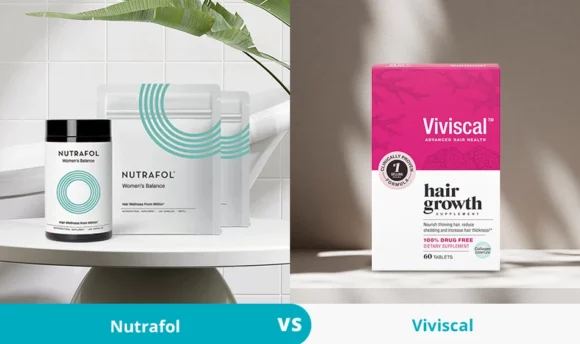Black Tea for Hair Growth: 5 Benefits, Side Effects, and Tips
Could black tea be the answer to your hair problems? Find out if this type of tea is good for hair growth or whether you should stick to consuming it as a hot beverage.

Made from the leaves of the camellia sinensis plant, black tea is most often enjoyed as a delicious drink to warm you up on a cold day. However, it also has several benefits when used as part of your haircare routine.
Whether you prefer black or green tea, you may think this beverage is an odd remedy for hair loss and growth. However, it has been used for many centuries as a treatment to increase shine, improve color, and promote growth.
Keep reading to find out if the tea is effective for stimulating hair growth and how you can do your own black tea hair rinse at home.
Does Black Tea Help With Hair Growth?
Black tea may be effective in promoting healthy hair growth due to its high caffeine content. However, more human research is needed to confirm its benefits for hair.
Caffeine is a natural stimulant that you may rely on to wake up in the morning and get through your afternoon slump. However, it is also an alkaloid compound that has been found to inhibit the production of dihydrotestosterone (DHT).
DHT is a hormone that makes hair follicles shrink and causes a condition called androgenic alopecia, or hair loss.
Another advantage of the caffeine in black tea for hair is that it helps prolong the anagen stage of your hair growth cycle, where the follicles receive blood carrying the nutrients it needs for growth.
It also has a positive effect on your hair’s ability to produce keratin, a type of protein that forms hair tissues. This is because caffeine prevents the death of keratinocytes, cells that produce keratin.
As a result, it helps your hair be much stronger, healthier, and more likely to grow.
Despite these positive indications, there is little research to suggest how much caffeine is needed to promote growing hair or how long it takes for you to see visible results from applying a black tea solution.
Therefore, more evidence is needed to fully conclude whether black tea is an effective treatment for fast hair growth.
5 Benefits of Black Tea on Hair
Rich in caffeine and antioxidants, black tea can help boost your hair health and may give you long, luscious locks. Here are the main benefits of trying a black tea hair rinse:
#1 Intensifies hair color
As suggested by the name, black tea contains dark pigments that can help to boost the color of your hair. It also reduces the appearance of natural gray hairs that you can develop as you age.
This is because it contains many tannins, polyphenols that naturally occur in fruits, vegetables, and beverages such as black and green tea.
These polyphenols are a type of antioxidant that neutralizes free radicals that can damage your hair and cause premature graying.
However, this is only a temporary fix for enhancing hair color, as it will fade after a few washes. A black tea rinse will also only work for those with naturally dark hair and does not have the same effects for lighter colors.
#2 Reduces hair loss
Along with helping enhance the color of your hair, the polyphenols present in black and green tea, such as theaflavins and thearubigins, help neutralize free radicals that cause oxidative stress in your body.
Free radicals may develop as a result of pollution, smoking, or UV radiation.
Oxidative stress speeds up your hair’s aging process and can harm the health of your scalp, causing dermatological conditions such as alopecia, a form of hair loss.
#3 Enhances hair shine
If you have dry or damaged hair, it’s likely to appear dull and lackluster on the outside. However, by improving your hair health and intensifying the color of darker locks, applying a black tea rinse can help to create a shine on your hair.
It will also feel much softer after consistently doing a black tea hair rinse 2–3 times per week.
#4 Supports scalp health
The antioxidants within black tea may protect the scalp from damaging environmental factors such as UV radiation, which can cause the skin and hair to age.
Along with regular scalp massage, applying a black tea hair rinse frequently can also boost blood circulation, meaning that your scalp receives the essential nutrients it needs to promote healthy hair.
#5 May boost hair growth
The high caffeine levels present in black tea may help stimulate hair growth by blocking dihydrotestosterone (DHT) production. This hormone clings onto hair follicles and inhibits hair growth, which can cause your hair to become thinner and shorter.
However, there is no evidence to prove that black tea is directly responsible for promoting hair growth. Despite this, it does help to boost the health of your strands and scalp, which creates the optimal environment for strong growth.
Side Effects of Black Tea on Hair
Although black tea has many benefits, it is important to gain a balanced view of the beverage to help you decide whether it is a suitable treatment for you.
Read on to see some of the potential negative side effects of black tea:
- Can dry the hair out: If you have low porosity hair, it means that your shaft may struggle to absorb moisture. When left on too long or used too frequently, a black tea rinse can cause dry locks for people with this hair type. Straight hair is more likely to have low porosity.
- May irritate sensitive skin: For those whose scalps are sensitive to natural products, black tea may cause an allergic reaction. Always do a patch test on your skin and be alert for any signs of redness, discoloration, or irritation.
- Might stain hair: For those with darker hair, black tea makes a great temporary hair dye. However, if you have blonde, white, or even lighter hair, using black tea rinses can cause dark stains that are very difficult to get out.
How to Use Black Tea for Hair Growth
Now that you know the benefits of black tea, you may be eager to use it on your hair. To help you get started, we’ve put together a step-by-step guide to applying this natural ingredient to your hair.
Below are some easy-to-follow instructions that will tell you exactly how to do your own black tea rinses at home:
- Place 3–4 black tea bags into a cup before pouring 2 cups of boiling water over the bags. Leave them to brew for about 1 hour, or until the water reaches room temperature, and then put the tea into a spray bottle.
- Wash your hair thoroughly with shampoo.
- Separate the damp hair into small sections and spray the black tea onto your scalp before massaging it in gently. Repeat this for all sections, spraying liberally until your whole head is covered.
- Once this process is complete, put a shower cap on to protect your hair and leave the tea to work its magic for 30–60 minutes.
- Rinse the black tea out with lukewarm water and apply a nourishing conditioner to prevent dryness.
Apply black tea directly to the scalp 2–3 times per week.
If you do want to enhance your hair color, you can spread the tea from root to tip, but you should apply a deep conditioner soon after to ensure that the hair remains hydrated.
The tea rinse can stain, so be sure to wear old clothes while applying it to your hair.
Black Tea and Hair Type
As we’ve already emphasized, black tea may not be good for those with lighter hair colors as it can cause a dark stain.
However, if you have brown, black, or dark gray hair, this is an ideal treatment that helps enhance color and provides you with luscious locks.
If you have sensitive skin on your scalp or dry, brittle hair that breaks easily, typical black tea rinses may be too strong for you. To prevent further irritation or breakage, try rinsing your hair with a brew made from just 1 or 2 tea bags and see how your hair responds.
Black tea is also an excellent treatment for those with particularly greasy hair. This is because it balances the pH levels of the scalp, helping to regulate the amount of oil produced.
On the other hand, if your hair is severely dry or damaged, you may not experience the full benefits of a tea rinse.
High amounts of caffeine may cause your hair to dry out even further, so if you do choose to apply black tea, always use a highly nourishing conditioner afterward.
Straight hair can sometimes struggle to absorb moisture as its outer cuticle layer lies very flat. Therefore, you may feel your hair drying out if a black tea solution is left on for too long, so use it cautiously.
FAQs
Yes, black tea contains pigments that help darken your hair, which is why it can be used as a hair dye. However, it will only temporarily stain your hair.
Drinking black tea has many of the same benefits as applying it directly to your scalp. Consuming it as a beverage may help with hair growth, as the antioxidants present in tea fight free radicals in the body that contribute to hair loss.
A Word From a Trichologist
Black tea has several benefits that may make it a good solution for promoting healthy, strong hair. Although there is no evidence linking this type of tea and hair growth, research suggests that its natural ingredients can help prevent hair loss.
However, if you are experiencing severe hair loss, you should consult a doctor or dermatologist before turning to black tea.
They may be able to provide a solution that helps to tackle the root cause of your hair loss, such as chronic stress, hormone imbalance, nutrient deficiency, or hair damage. For example, they may recommend the best way to dry hair to avoid damage.
Like with any new haircare treatment, you should always do a patch test on your arm to ensure that you don’t have an allergic reaction, especially if you have sensitive skin.
Leave the tea for 24 hours and then check for any signs of irritation, including redness or discoloration.
Conclusion
Along with helping to warm you up as a delicious drink, black tea is an old and affordable treatment that still has many benefits for haircare today. Try black tea rinses 2–3 times per week, and you’re likely to see healthier hair in just a few weeks.
Although it may help to promote hair growth, improve shine, and prevent premature graying, there is not much evidence to prove that this tea is a definite cure for your hair woes.
It is an ideal treatment for those with super oily hair but may cause further damage for drier hair types.

















































 Select your language:
Select your language: 








